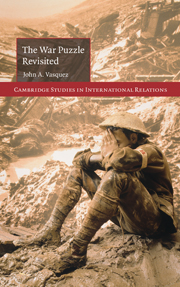Book contents
- Frontmatter
- Contents
- List of Figures
- List of Tables
- Preface
- Preface to the Original Text
- PART I Preliminaries
- PART II The Onset and Expansion of Wars of Rivalry
- PART III Findings on the Steps to War, 1994–2008
- Appendix I A Propositional Summary
- Appendix II Major Findings on the Steps to War
- References
- Index
- CAMBRIDGE STUDIES IN INTERNATIONAL RELATIONS
Preface to the Original Text
Published online by Cambridge University Press: 05 June 2012
- Frontmatter
- Contents
- List of Figures
- List of Tables
- Preface
- Preface to the Original Text
- PART I Preliminaries
- PART II The Onset and Expansion of Wars of Rivalry
- PART III Findings on the Steps to War, 1994–2008
- Appendix I A Propositional Summary
- Appendix II Major Findings on the Steps to War
- References
- Index
- CAMBRIDGE STUDIES IN INTERNATIONAL RELATIONS
Summary
This book treats war as a social phenomenon that recurs in human experience. Instead of focusing on any particular war, I am interested in systematically describing those factors which are common to wars and to the peace that follows to see if there is a pattern that suggests why war recurs and how it might be avoided or mitigated. The end result will be an explanation of the onset and expansion of war and the conditions of a stable peace. This involves explaining why and how wars occur, why some wars expand, why some historical periods and interstate relationships are more peaceful than others, why some peaces last longer than others, and how they work to avoid war.
The task set forth in this book would be almost impossible for a single individual to tackle were it not for an international community of peace researchers who have been dedicated to investigating manageable portions of the problem in a rigorous way. Their efforts have made mine possible. They have contributed a new body of evidence and insight on war and peace distinct from those provided by history, traditional discourse, and political philosophy. In this book, I seek to integrate and explain their findings in a way that will move the culmination of scientific knowledge on war and peace forward.
My greatest debt is to those peace researchers who have painstakingly worked to document generalizations about war and peace. My debt to them is acknowledged in the text every time I discuss their work and cite their studies.
- Type
- Chapter
- Information
- The War Puzzle Revisited , pp. xix - xxiiPublisher: Cambridge University PressPrint publication year: 2009



